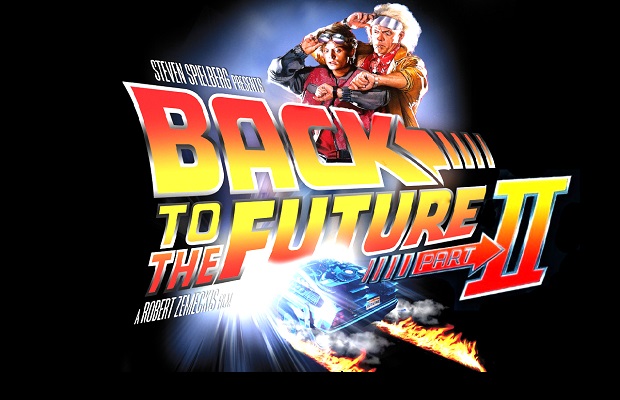Great Scott! As Wednesday, 21 October 2015 marks the day that Marty and Doc arrive in the film Back to The Future Part II, Netimperative looks at how accurate the films’ predictions have been- from wearable tech to power laces.
When Back to The Future Part II came out in 1989, it portrayed a life with hoverboards, flying cars and some pretty dodgy fashion. But how different is life now and what did the film makers get right?
What Back to the Future II got right
“There’s something very familiar about all this”- Marty McFly
3D movies
Fortunately, we’ve not been graced with Jaws 19 (directed by Max Spielberg) in cinemas, but 3D films shown in the film look primitive compared to the likes of Avatar. As Marty said: “The shark still looks fake”.
Video calls
Marty make a video call to his colleague Needles in the film, something we’ve already been able to do for years thanks to the likes of Facetime, Skype and Google Hangouts.
Tablets
Marty is asked for a donation for the clock tower by using his fingerprint on a tablet-type device- a common accessory in many households and among business workers.
Smart glasses
Marty’s future children wore headsets which made and received calls, and let them watch TV, much like Google Glass, Occulus Rift and Microsoft’s Hololens can do today.
What it nearly got right about 2015
“Your kids are gonna love it”- Marty McFly
Drones walking dogs
The film showed dogs being taken for walks by flying drones- not a common sight in the streets nowadays. But if this video is to be believed, we could see more canine helpers in the future.
Walking Dogs With Drones from Jeff Myers on Vimeo.
Fingerprint recognition
The film saw fingerprints replacing door keys and credit cards. We’re not quite there yet, but smartphone fingerprint recoignition and the likes of Apple Pay suggests this technology might not be far off.
Power laces
Marty’s Nike trainers had convenient ‘power lacing’. Although Nike has already produced a replica of their famous Back to the Future shoes with regular low-tech laces, the company said a version with self-tying powered laces, like those seen in the movie, will debut this year. So far there’s been no sign of them – maybe a surprise release on October 21st is in the works?
Weather forecasts
To predict a lightning strike, Doc Brown was able to forecast the weather down to the second. We’re still some way off this level of precision, but we can see how the weather will be hourly on our mobile phones. Still often wrong though…
What it got wrong about 2015
“No one should know too much about their destiny”- Doc Emmet Brown
Hoverboards
Marty stole a hoverboard from a little girl in Back to the Future Part II and the device worked everywhere, except on water in a crucial scene. Despite many efforts (including the one below, tested by skate board legend Tony Hawk) we’ve only managed magnetic boards that can’t fly above anything.
Flying cars
Doc Brown told Marty “we don’t need roads” as he revved up his flying car at the end of the first film. Technology hasn’t quite matched this prediction. It would make traffic jams much less likely, although it would also be more of a strain on air traffic control. We do have flying drones though…
Food hydrators
Forget microwaves- a marvel of the McFly kitchen was a Black & Decker Food Hydrator that rehydrates, cooks and expands a miniature pizza into a meal-sized pie. Unfortunately this space saving invention never came to pass. But that didn’t stop Pizza Express tweeting this spoof video:
PizzaExpress Hydrated is here. We sure can hydrate a pizza! #BackToTheFuture #BTTF2015
https://t.co/m8Lm2JGwyX
— PizzaExpress (@PizzaExpress) October 21, 2015
Fashion
From hats that looks like metallic cereal bowls to double neckties (because one tie isn’t uncomfortable enough), Back to the Future’s take on 2015 fashion was mercifully way off-base. A self-drying jacket could come in handy, though.
[poll id=”10″]
Analysis- film’s real legacy is product placement
Daniel Todaro MD of Gekko, looked at whether Back to the Future nailed product placement and the relationship between brands and filmmakers when it comes to the production of seminal films.
“The relationship between brands and filmmaking has always been a tricky one especially when product placement detracts from the plot for the sake of advertising. On the one hand, there is the commercial thrust from the brand that wants to be in the film and on the other, the filmmaker who wants to ensure the film retains its integrity and doesn’t ‘sell out to the corporate world’.
“With Back to the Future celebrating its 30th anniversary today, and a lot of the hype around this seminal film which resonates with so many in my age group, it focuses on whether the film has actually predicted anything about the future, today 21st October 2015, through its product placement.
“By no means do brands always get product placement right but Back to the Future is a showcase example of how brands can add value to the script. The brands fitted in to the film, they were contextual and relevant to the script, and from a brand point of view they allowed big corporates to advertise their products as ‘futuristic and forward thinking’, well some of them perhaps.
“Fortunately for the brands in this particular film, many got it right, but where there is a fine line between brand success and irrelevant advertising when it comes to product placement, did they predict or allow the film to define the future?”
